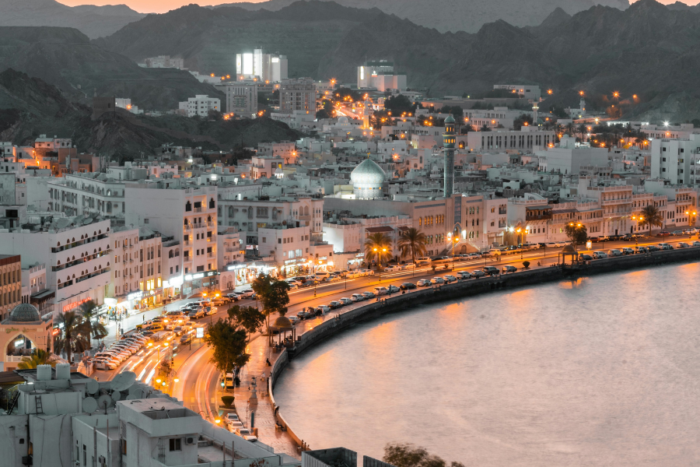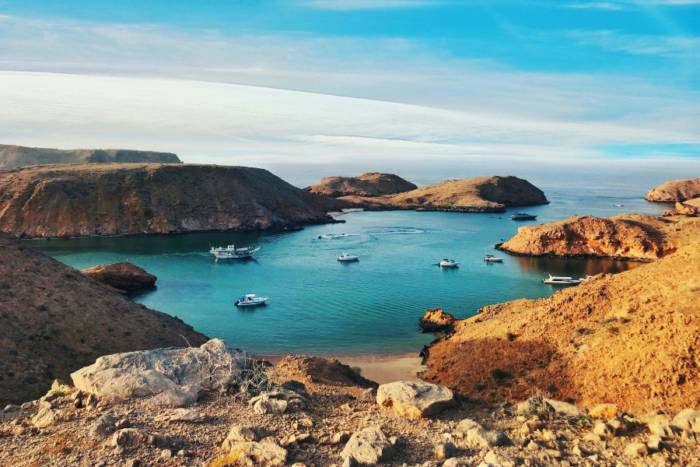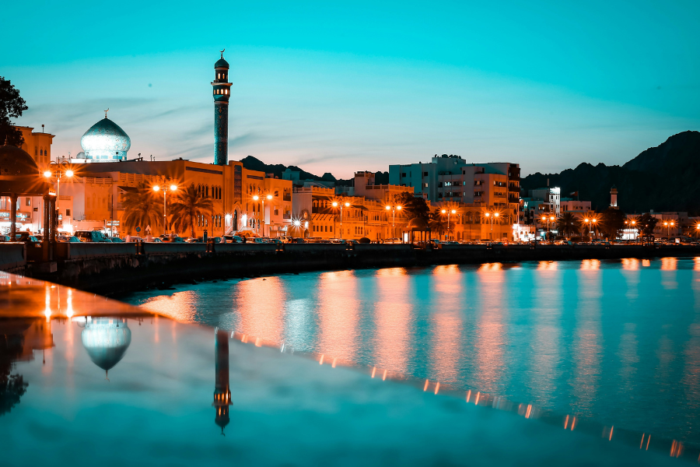Investing in Oman Real Estate
May 28, 2025
Oman is quietly emerging as one of the Gulf region’s most compelling – and underestimated – real estate opportunities.
Unlike some of its flashier neighbours, Oman isn’t chasing global headlines with record-breaking skyscrapers or high-speed mega-projects.
Instead, it offers a more measured, sustainable proposition with a focus on nature, lifestyle and long-term value.
Ambitious national initiatives like Oman Vision 2040 underpin the country’s strategy of carefully planned growth across infrastructure, tourism and real estate.
A key part of this plan includes the development of Integrated Tourism Complexes (ITCs): specially designated zones where foreigners can legally purchase freehold property, often with residency benefits attached.
For the discerning investor, this spells opportunity. Oman’s property market is still maturing, offering lower barriers to entry, less saturation and stronger upside potential – especially in growth-aligned areas backed by government policy.
In this guide, the Nomad Capitalist team explores where Oman’s real estate market is headed, what sets it apart from other regional jurisdictions and how strategic investors can tap into a rising market that’s quickly building momentum but still managing to stay beneath the radar.
Pros and Cons of Investing in Oman Real Estate

As with any investment, it’s wise to consider the realities before diving in. Here’s what you need to know about Oman’s property landscape.
Pros of Investing in Oman Real Estate
If you’re scouting for international property that offers both a reliable base and genuine potential for growth, Oman is well worth your attention.
The Sultanate is courting foreign capital through concrete initiatives. Chief among them is the Golden Visa program, which links real estate purchases within designated ITCs directly to long-term residency visas.
This offers a lucrative Plan B, where you can gain a tax-friendly residence to use now or when circumstances dictate.
Alongside this, Oman’s Vision 2040 plan is investing in upgrading the country’s infrastructure – Muscat’s international airport, better roads and high-quality property developments.
Beyond that, there’s the potential for earning rental income.
Oman attracts a steady stream of tourists keen on its unique culture and scenery, plus a consistent population of professional expats. Such dual demand creates a strong rental market, particularly in sought-after areas.
Finally, Oman has no income taxes at all. That means your gains are yours to keep if you become a tax resident here.
Cons of Investing in Oman Real Estate
No investment is without potential downsides, and Oman is no exception.
Firstly, market liquidity in Oman might not always match major global property hubs. It could potentially take longer to sell property in Oman than in popular places like London, Singapore or Dubai.
Secondly, attractive freehold ownership for foreigners is primarily confined to those specific ITCs. Unfortunately, this regulation limits your geographical options if you were hoping to buy a freehold property anywhere across the Sultanate.
While Oman is making impressive strides with its Vision 2040, its economy is still tied to oil revenue fluctuations and other regional factors, which can affect market prices.
Oman’s Real Estate Market in 2025
In 2025, Oman’s property market continues on its path of steady, regulated growth.
Here’s what you need to know about investing in real estate in Oman.
Oman Real Estate Hubs
Let’s start with location – because, as we know, it’s the most important part of any property investment.
Unsurprisingly, the capital, Muscat, remains the undisputed heart of Oman’s property scene. It’s the main engine for business and holds the lion’s share of premium residential addresses.
Within Muscat itself, certain areas stand out:
- Qurum: Due to its prestige with its leafy streets and larger homes
- Shatti Al Qurum: Due to its sought-after beachfront apartments and villas with direct sea access
- Madinat Al Sultan Qaboos: Due to its spacious villas, international schools and community feel.
However, for many international buyers, the main point of interest is typically within the ITCs. Here, foreigners can purchase property on a freehold basis – owning the land outright.
The most iconic example is undoubtedly Al Mouj Muscat – a wealthy coastal town with its own world-class marina, signature golf course, retail outlets and a wide array of apartments and villas.
For those seeking exclusivity, Muscat Bay is a luxurious, more private option tucked in between the Al Hajar Mountains and the sea.
Looking further south to the Dhofar governorate, Hawana Salalah has a distinct resort-style living experience with growing tourist appeal.
Types of Investment Properties
You’ll be glad to know that Oman has real estate options to suit most tastes and investment strategies.
Apartments make up a big portion of the stock, varying from compact one-bedroom units to larger multi-bedroom residences and high-spec penthouses.
Townhouses are another common category, generally with more internal space than apartments and often arranged over multiple floors. These frequently include small private outdoor areas like patios or roof terraces, sitting between apartment blocks and fully detached homes.
Villas make up the upper end of the residential property offering. They usually come with private gardens and swimming pools, with architectural styles ranging from modern designs to those with specific Omani features.
The Legal Side of Oman Real Estate Investments
Oman has specific laws governing property ownership, particularly for foreign nationals.
As a general rule, non-Gulf nationals cannot own land or real estate on a freehold basis across most of the Sultanate, only within ITCs.
Outside of ITCs, the concept of ‘usufruct’ comes into play.
This, however, isn’t ownership of the land itself, but rather a long-term right (often up to 50 or sometimes even 99 years in specific cases) to use and benefit from a property.
While potentially relevant for certain large-scale projects or specific agreements, for most investors targeting Oman, the freehold property within the ITCs remains the best option.
The Property Purchase Process for Foreigners in Oman

The purchase process for a foreigner buying within an Omani ITC is generally quite structured, which is reassuring.
Naturally, you first select your desired apartment, villa or townhouse. Then, you’ll typically sign a reservation form and pay an initial deposit to take that specific unit off the market.
Following this comes reviewing and executing the formal Sales and Purchase Agreement (SPA) with the developer.
As you make payments according to the SPA, the last step requires you to formally register the property transaction with Oman’s Ministry of Housing and Urban Planning.
Once registration is complete and the final payments are settled, you receive your official title deed, known locally as the ‘Mulkiya’, confirming your ownership.
In terms of costs, you’ll need to budget for the government’s property registration fee, which currently stands at 3% of the agreed property value, payable upon registration.
Golden Visa by Real Estate Investment
Another reason so many people are investing in Omani ITCs is due to the direct pathway to residency through its Golden Visa program.
Purchasing qualifying property valued at a minimum of OMR 250,000 (around US$650,000) typically makes you eligible to apply for a five-year renewable investor residency visa.
If your real estate investment within an ITC reaches OMR 500,000 or more, you can usually aim for a longer-term 10-year renewable visa.
The application for residence is made after you’ve completed the property purchase and have the title deed in hand.
It involves submitting documentation, including proof of ownership, through the designated online portal managed by the Ministry of Commerce, Industry and Investment Promotion.
Top Tips for Oman Real Estate Investors
To help you make the best of Oman’s property market, keep these three tips in mind.
- Conducting Thorough Due Diligence: Rigorous due diligence is absolutely non-negotiable when investing in Omani real estate. Take the time to thoroughly research your chosen developer – their reputation and track record for delivering on promises. Pay extremely close attention to the details within the Sales and Purchase Agreement (SPA) details. You need to understand every clause, especially concerning payment schedules, completion dates and handover conditions.
- Property Management Services: If you plan to be an overseas landlord, factor in the use of a property management team from the start. Reputable local agencies can handle tenant sourcing, rent collection and dealing with maintenance, saving you time and potential headaches.
- Ongoing Ownership Costs: Remember to budget realistically for the ongoing ownership costs. Within ITCs, expect regular service charges to cover the maintenance of communal areas and facilities. You’ll also have your own property’s upkeep and utility bills to consider. The upside is that Oman generally spares residential property owners from significant annual property taxes.
Investing in Oman: FAQs
The Oman Investment Authority (OIA) is the sovereign wealth fund in Oman which manages national assets. It invests domestically and internationally across various sectors, aiming for sustainable economic growth and generating long-term returns for the Sultanate.
Oman’s currency is the Omani Rial (OMR). It’s pegged to the US Dollar at a fixed rate of 1 OMR to US$2.60.
The capital city of the Sultanate of Oman is Muscat, located on the coast of the Gulf of Oman.
Oman is very safe. It has low crime rates and enjoys political stability, much like many of its neighbouring countries.
The official language of Oman is Arabic. However, English is widely spoken, particularly within the business community, tourism sector and urban areas. Many official documents and road signs are bilingual.
Oman has a hot, arid desert climate. Summers (May – September) are very hot and humid along the coast, while winters (October – April) are milder and more pleasant. The Dhofar region experiences a monsoon season (Khareef) from June to September.
Invest Strategically in Your Residency

Oman may be one of the Gulf’s most underrated real estate markets but the country is about more than just property.
There’s also a golden visa, making home ownership here a strategic move for investors seeking residency, lifestyle or a long-term Plan B. But it’s still just one piece of the global investment puzzle.
Other countries – from Greece to Turkey or the Caribbean nations – also provide pathways to residency or even citizenship through real estate investment.
Each country’s program comes with its own rules, investment thresholds, processing times, benefits and downsides.
Navigating these options and matching them to your personal goals takes more than a casual glance – it requires experience, insight and a global perspective.
If you’re ready to explore property investment in Oman – or anywhere else that aligns with your offshore strategy – the Nomad Capitalist team is here to help you go where you’re treated best.



How to Eliminate US Expat Taxes (by Renouncing)
A common myth persists among many Americans that they can’t benefit from the same tax-saving opportunities as other expats when moving overseas. That misconception is rooted in the United States’ insistence on implementing citizenship-based taxation, requiring their citizens to report and pay tax on their worldwide income – regardless of where they live. As a […]
Read more

Canada Capital Gains Tax: How it Works
Beneath Canada’s welcoming exterior lies a tax system that quietly drains personal and investment wealth through ordinary income, estate and capital gains taxes. For high-net-worth individuals (HNWIs) and investors, the lack of competitive tax incentives compared to other jurisdictions can make Canada an expensive place to grow long-term wealth. If you’re serious about growing and […]
Read more

The Best Countries for Investing in the Middle East 2025
The global investment landscape has changed dramatically. Gone are the days when opportunities were limited by geography or confined to traditional stocks and bonds sold only through standardised, rigid and often cumbersome channels. Back then, going ‘global’ might have just meant adding a few European equities to a US-based portfolio. Today, everything has changed. Barriers […]
Read more




